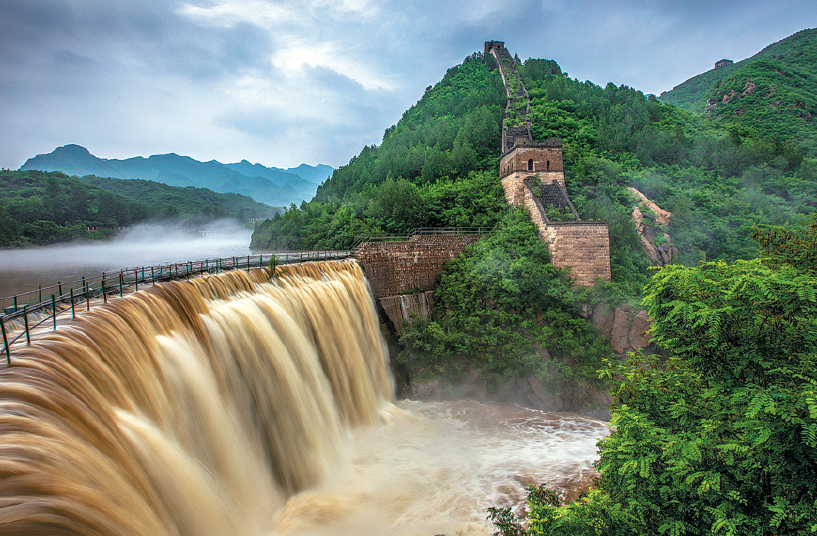China advances in stemming water waste

A waterfall is seen at the Huanghuacheng Great Wall Reservoir in Beijing's Huairou district, July 18, 2021. [Photo by Yang Dong/For China Daily]
Ministry cites efficient use in industry, irrigation, vows more conservation efforts
China has made significant progress in water conservation and in tackling the overexploitation of groundwater in the past seven years as a result of water management reforms implemented by central authorities, according to Water Resources Minister Li Guoying.
"The country has made historic achievements and experienced a transformation in water governance," he said at a ministry conference held ahead of World Water Day on March 22.
Compared with 2015 levels, national water consumption per unit of GDP last year had dropped by 32.2 percent, he said. The decrease per unit of industrial added value during the same period was 43.8 percent.
Li said the effective utilization of irrigation water-the percentage of water diverted from its source that actually reaches crops and contributes to growth-reached 56.5 percent in 2021, compared to 53.6 percent in 2015, and that despite sustained economic growth, the country's overall water consumption has been kept well below 610 billion cubic meters a year.
"With only 6 percent of the world's fresh water resources, China manages to provide water for one-fifth of the world's population and for its continued economic growth," he said.
Li also noted a marked achievement in addressing groundwater depletion in the Beijing-Tianjin-Hebei province cluster.
The level of shallow groundwater in the region rose by 1.89 meters in the past three years. As for confined groundwater, located deeper underground, the region averaged a rise of 4.65 meters during the same period.
The minister said these positive changes are due to the importance President Xi Jinping has placed on water governance.
In a meeting on financial and economic affairs in 2014, Xi advanced his "concept on water governance with 16 Chinese characteristics", which has provided the ministry with guidelines for action, Li said.
Xi demanded that top priority should be given to water conservation. He also stressed the balance between development and the carrying capacity of water resources. Carrying capacity refers to the ability of a water resource in providing for the economic, social and ecological environment.
While visiting a water control project in Yangzhou, Jiangsu province to learn about the eastern route of the national South-to-North Water Diversion Project in late 2020, Xi urged a rigorous combination of the implementation of the project and of water-saving efforts in northern China.
The project has alleviated water shortages in northern China to a certain extent, but the national distribution of water resources is generally still characterized by deficiency in the north and sufficiency in the south, Xi said.
The president stressed shaping the development of cities and industries according to water availability and making more efforts on water conservation, noting that an increased south-to-north water supply should not happen alongside willful wastage.
Li promised a series of measures that will take Xi's instructions as a guide.
The ministry will tightly control the amount of water used nationally and the assessment of the impact of new projects on water resources will be more stringent, he said. The monitoring of carrying capacity will be strengthened and areas subject to overexploitation will not be granted new water consumption permits.
As part of its endeavors to improve the national water supply network, Li said the ministry will speed up construction of major water diversion projects and key water sources.
























